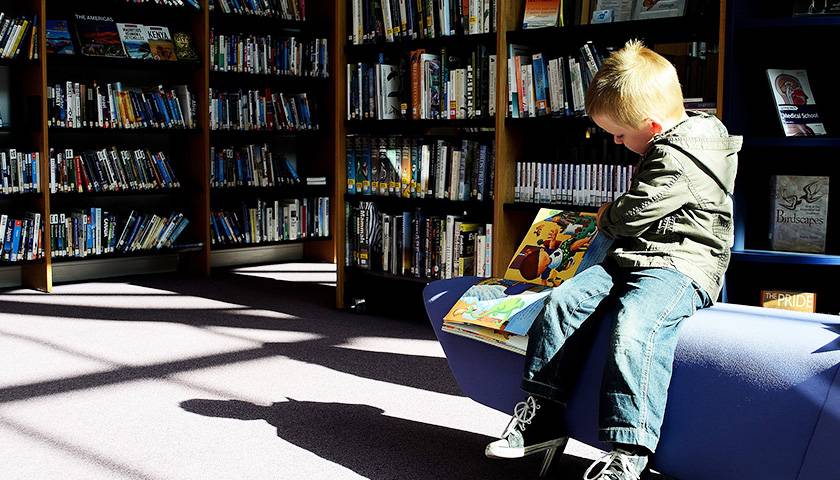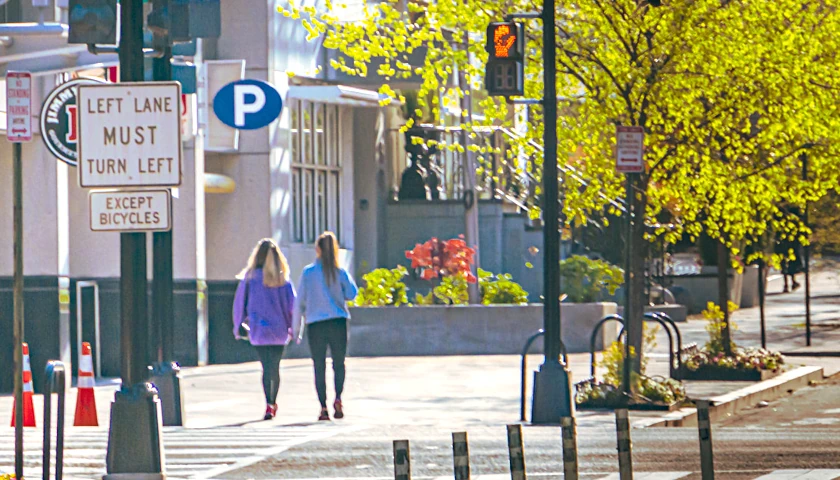by Tom Gantert
The Ann Arbor public school district has a book available in its pre-kindergarten library called “Introducing Teddy: a gentle story about gender and friendship.” The book is about a boy’s best friend and teddy, Thomas, who is sad because “he wishes he were a girl, not a boy teddy, but what only matters to both of them is that they are friends.”
School districts across the country purchased books in 2022 that cover controversial topics such as critical race theory, white supremacy and gender dysphoria.
The Center Square filed Freedom of Information Act requests with numerous school districts around the country and asked for the books they purchased for their K-12 libraries.
The school districts that responded were in Traverse City and Ann Arbor in Michigan; Columbus, Ohio; Madison, Wisconsin; and Seattle. Thus far, only Ann Arbor has responded to emails seeking comment on its selection of library books.
“Books are added to our library according to student interests and are vetted using a couple of trusted sources, one of which is the American Library Association,” said Andrew Cluley, spokesperson for the Ann Arbor school district. “All books have suggested age recommendations and while we cannot read every book we make available in our libraries, the librarians do read the reviews and descriptions carefully. Each librarian has discretion about books they add and they also have access to books added at the district level through Sora.”
SORA is a student reading app.
“We don’t have a specific policy over what age we introduce books on gender and race relations,” Cluley said. “Decisions are based on the text being age appropriate for the students.”
Seattle’s school district purchased “Rise Up! How you can join the fight against white supremacy.”
The book claims, “The racism we all still live with is maintained through everyday interactions that teach people to discriminate on the basis of skin color and other physical features. White supremacy seeps into our politics and laws, our education system, the economic sector, the images we see in the media and the way we stereotype and treat one another.”
Many of the school districts bought controversial books – such as “Gender Queer” by Maia Kobabe – and books on sexuality and race.
The American Library Association reported that “Gender Queer” was the No. 1 banned book. The library association stated, “Reasons: Banned, challenged, and restricted for LGBTQIA+ content, and because it was considered to have sexually explicit images.”
Bridge Michigan, a nonprofit news site, described “Gender Queer” in this manner on March 20: “The book tells the story of how the author came to terms as a teen with their sexual identity, the difficulties of coming out as nonbinary to family and friends and navigating issues of sexuality.”
The Iowa Standard published images of the graphic novel’s illustrations that show the main character with blood on his legs and underwear from a period, a blood-covered tampon, a toy vibrator that led to “my first orgasm” and two illustrations of young people engaged in oral sex.
“Gender Queer” was purchased by the Madison public school district last year. Other books bought included titles such as “A kids book about being non-binary,” “A kids book about being transgender,” “A kids book about systemic racism,” “White Supremacy, a guided journal,” “Queer: the ultimate LGBTQ guide of teens,” “Queer ducks (and other animals) the natural world of animal sexuality,” as well as numerous other books exploring the issue of gender and white supremacy.
In Seattle, some of the books purchased in 2022 included “Rise Up! How you can join the fight against white supremacy” and “Read this to get smarter: about race, class, gender, disability & more.”
Seattle’s school district also bought “Race Cars: A children’s Book about White Privilege.” Amazon stated the book was “Written by a clinical social worker and child therapist with experience in anti-bias training and edited by a diversity expert …”
The children’s book describes a black race car called Chase who in a race beats Ace, a white race car.
White cars had always won races in the past, the book said.
All the cars on the race committee were white and they made all the rules. They were unhappy a black car won.
“We have always given the white cars the fastest tires and the most powerful engines. How could a black car have won?” the all-white car committee asked in the book.
For the next race, the committee erected a “Bridge is for white cars only” sign and all other cars had to go around the river. Even when forced to take the longer route, the black car finished second.
The all-white-car committee was upset a black car placed second. So the next year they had a race officer stop the black car and asked for identification. Chase was perplexed that none of the white cars were stopped. Chase wasn’t able to place in the race.
So the all-white committee added a new rule – cars that did not place could not race the next year. Chase was not allowed to race.
While racing, the white car Ace discovered the committee had created a longer path for all non-white cars and that was why Ace was winning.
Finally, Grace, the only female white car on the all-white committee, tells the committee to make the race fair.
“The selection of these books is a blatant, purposeful, unapologetic act by the school district leadership to indoctrinate children into their warped woke ideology, plain and simple,” Elana Fishbein, founder and president of No Left Turn in Education, said in an email to The Center Square. “These books are intended to generate guilt in young white children and immerse all children in the LQBTQIA+ lifestyle. This is child abuse packaged under the label of ‘inclusivity’, aided by the complicity of the teachers unions, librarians, and the many radical politicians who have dominated public offices in the State of Washington for decades. One needs to look no farther than the educational priorities of the Seattle public schools to understand why there is a steep decline in the quality of life in the Emerald City.”
What children have access to at their school libraries has become a hot topic nationally. House Committee on the Judiciary Subcommittee on the Constitution held a hearing March 23 on the issue.
“Today, we are in the midst of the broadest attack on First Amendment rights in schools and universities this country has seen in generations,” said Nadine Farid Johnson, managing director of Washington and Free Expression Programs, PEN America, in her testimony. “From book bans to curriculum restrictions, state and local officials across the country are engaging in government-mandated censorship. They are undermining students’ right to receive information, and impairing their freedom to learn. They are putting obstacle after obstacle in front of teachers and librarians to make it difficult for them to carry out their duties as educators.
The GOP-controlled U.S. House of Representatives passed the Parents Bill of Rights Act on March 24 that would require schools to give parents a list of books and reading materials available in the school library.
Many state legislatures are joining the discussion on just what is appropriate for a public library and people under 18.
In Michigan, Republican state Rep. Neil Friske introduced House Bill 4136 in February that “restricts items deemed sexually explicit or obscene, and would move them to an adults-only section of public libraries that would be inaccessible to anyone under the age of 18.”
In Indiana, Republican state Senators James Tomes, Blake Doriot and Tyler Johnson introduced Senate Bill 12 in February that states “a school library may not make a book available that contains obscene matter or matters harmful to children.”
The American Library Association didn’t respond to an email seeking comment.
– – –
Tom Gantert worked at many daily newspapers including the Ann Arbor News, Lansing State Journal and USA Today. Gantert was the managing editor of Michigan Capitol Confidential for five years before joining The Center Square.
Photo “Child Reading a Book in the Library” by PublicDomainPictures.






The Iowa Standard published images of the graphic novel’s illustrations that show the main character with blood on his legs and underwear from a period, a blood-covered tampon, a toy vibrator that led to “my first orgasm” and two illustrations of young people engaged in oral sex. !!!! What POS would put such in a school library? Seattle a city known to be run by racist trash has Put “Race Cars: A children’s Book about White Privilege.” on the shelves. A book written to agitate and stir up racial hatred. Why would anyone support such provokative crap in schools? If you don’t confront the sorry school officials permitting such then you deserve for your child to see it and be upset about it.